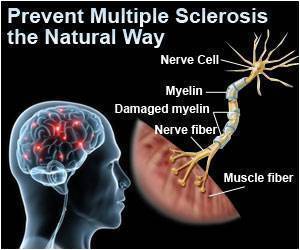Stem cell therapy may be beneficial in people with secondary progressive multiple sclerosis, according to a recent study.
Multiple sclerosis is a condition that leaves the affected person with severe disability, ultimately requiring managed care. In multiple sclerosis, the covering of the nerves called myelin sheath is damaged; this is followed by damage of the underlying nerves. Most patients suffer from attacks and completely recover between the attacks. This type of multiple sclerosis, called the relapsing-remitting type, may progress to a stage of continuous deterioration referred to as secondary progressive multiple sclerosis. (In contrast, patients with primary progressive multiple sclerosis do not recover between attacks and only show a progressive decline). Patients with progressive disease do not respond to the available treatments.Stem cell therapy has revolutionized treatment in a number of conditions that were previously thought to be incurable. Stem cells are undifferentiated cells which can convert themselves to any type of specialized cells. Studies in mice show that stem cells from the bone marrow may provide neuroprotection and improve function in multiple sclerosis.
A study was conducted in the United Kingdom to test the effect and safety of stem cell therapy on patients with secondary progressive multiple sclerosis. Ten patients, who suffered from eye problems where the optic nerve was damaged due to the multiple sclerosis, were included in the study. Stem cells were obtained from the patients’ bone marrow. They were then processed and injected into the veins of the patients.
Following the stem cell treatment, an improvement was observed in some visual parameters: There was an increase in optic nerve area, visual acuity and reduction in visual evoked response latency; these parameters indicate neuroprotective effects of the stem cells. It is possible that stem cells help in remyelination of the nerves.
Adverse events observed following treatment were mild and included rash in one patient, scalp itching in another, a respiratory tract infection in the third (these did not require treatment) and a urinary tract infection in a fourth patient that required antibiotics. Thus, significant adverse effects were not observed during the study.
Though the study has some limitations, it does offer some hope for patients with multiple sclerosis.
1. Autologous mesenchymal stem cells for the treatment of secondary progressive multiple sclerosis: an open-label phase 2a proof-of-concept study; Peter Connick et al; The Lancet Neurology 2012.














